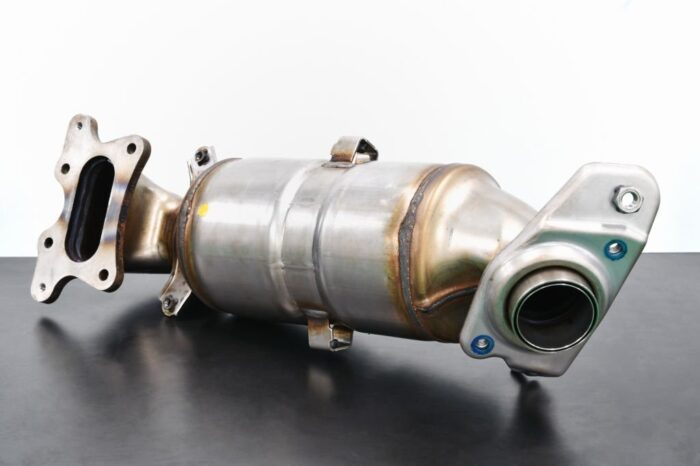Filtercat is a newly-created Indian company catering to the Catalytic Converter Replacement Market. They also manufacture universal catalytic converters, specific ready-to-fit converters and diesel particulate filter (DPF) for Asiatic and European vehicles.
Universal Catalytic Converters Product Range
Universal converters for petrol and diesel vehicles
| Reference | Fuel | Shape | Lenght (mm) | Weight (Kg) |
| UBO001 | Petrol | Oval | 333 | 1.85 |
| UBO002 | Petrol | Oval | 528 | 2.3 |
| UBO003 | Petrol | Oval | 505 | 2.35 |
| UBO004 | Petrol | Oval | 505 | 2.5 |
| UBO005 | Petrol | Oval | 605 | 2.65 |
| UBR001 | Petrol | Round | 333 | 2.15 |
| UBR002 | Petrol | Round | 528 | 2.4 |
| UBR003 | Petrol | Round | 528 | 2.45 |
| UDO001 | Diesel | Oval | 505 | 2.35 |
| UDO002 | Diesel | Oval | 505 | 2.5 |
| UDR001 | Diesel | Round | 333 | 2.15 |
| UDR002 | Diesel | Round | 528 | 2.4 |
Catalytic Converter Replacement
A catalytic converter can be defined as an emissions control device that reduces toxic gases and pollutants from the exhaust of an internal combustion engine. It works by converting harmful pollutants into less harmful compounds. The primary purpose of a catalytic converter is to reduce the environmental consequences of the engine’s exhaust.
When an engine combusts fuel, the exhaust gases produced contain large amounts of nitrogen oxides, carbon monoxide, and hydrocarbons. These are very harmful pollutants and can have an adverse effect on human health, as well as the effectiveness of the climate. Catalytic converters are installed after the engine, typically in the exhaust pipe, to convert these pollutants into less harmful compounds such as nitrogen, carbon dioxide, and water vapor.
The catalytic converter utilizes a catalyst to activate chemical reactions that break down hazardous exhaust components while also producing less harmful compounds. Typically, the catalyst that is used is a metal-oxide in the form of a honeycomb-like or flat matrix. The metal oxide contains different elements that act as catalysts for chemical reactions. The most common metals used in catalytic converters are platinum, rhodium, and palladium. These metals work together to initiate several chemical reactions, such as oxidation and reduction, which break down the various gases in the exhaust.
One of the most common catalytic converters is the three-way converter. These are the most efficient type of catalytic converter and are designed to reduce nitrogen oxides, hydrocarbons, and carbon monoxide. A three-way catalytic converter uses platinum, rhodium, and palladium to catalyze three separate chemical reactions. The first reaction converts nitrogen oxides into nitrogen and oxygen. The second reaction reduces hydrocarbons and carbon monoxide into carbon dioxide and water. The third reaction produces CO2 directly.
Another type of catalytic converter is the oxidation catalyst. This type of converter reduces hydrocarbons and carbon monoxide in the exhaust. Unlike the three-way converter, it does not reduce nitrogen oxides. It uses the same metal-oxide matrix with platinum, rhodium, and palladium, but the catalyst only initiates an oxidation reaction instead of a reduction reaction.
Catalytic converters play a pivotal role in reducing the emissions from an internal combustion engine. They are efficient, cost-effective, and an integral part of modern engines. Furthermore, It is important that these converters are inspected and maintained regularly in order to ensure peak performance. Failing to do so can lead to clogging and reduced effectiveness, resulting in higher emissions.
Filtercat Catalytic Converters and DPF
Plot no. K-16 Phase II,
SIPCOT Industrial Park,
Mambakkam Village, Sriperumbudur,
Kancheepuram District – 602105,
Tamil Nadu, INDIA
info@filter-cat.com
+91-44-67219495
https://www.filter-cat.com/default.aspx
You may also be interested in this company manufacturing Dust Collector Filter Bags.

One thought on “Filtercat”